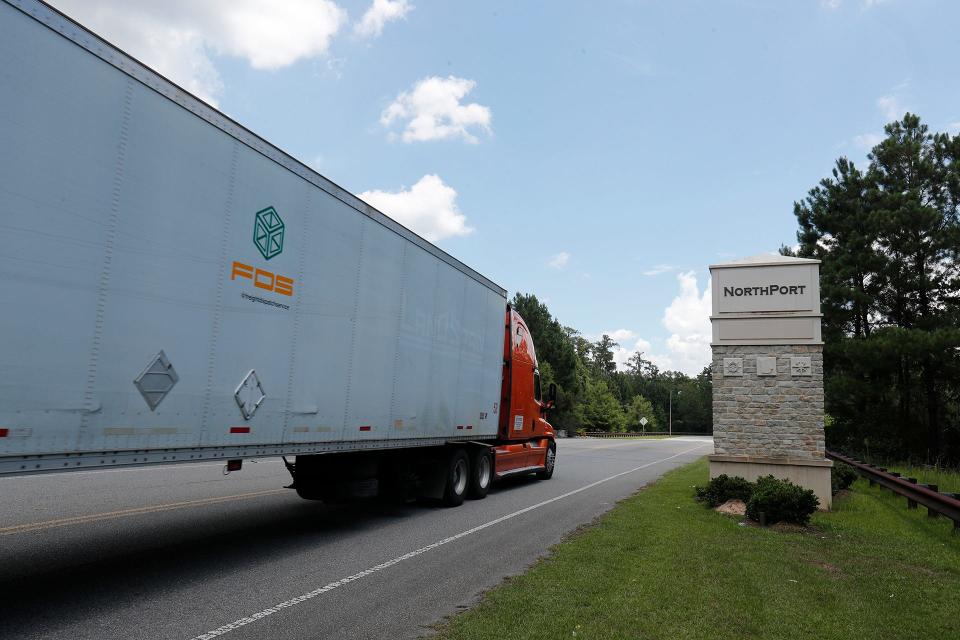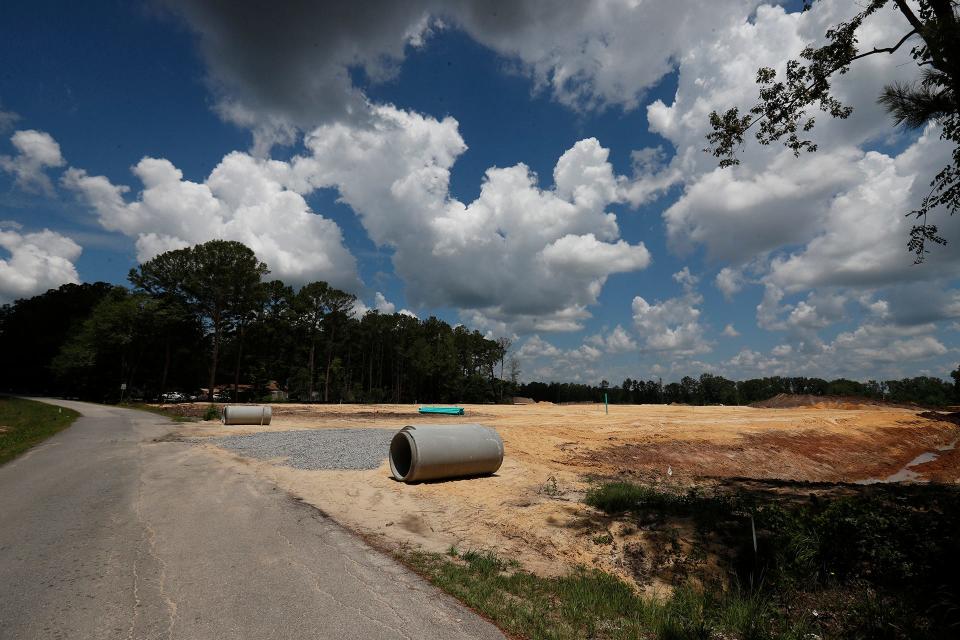Auditors: Port Wentworth’s comprehensive plan is 'vague' and 'contains no real vision'
Port Wentworth’s efforts to rectify its growth plan continue. For years, the port city has struggled to balance industrial development with residential needs – a battle that’s led to inter-council conflict, a near city split and, ultimately, prompted the current overhaul of the city’s planning and zoning laws.
Now, Port Wentworth is likely looking at a revision of its 2021-41 Comprehensive Plan, a critical document that governs future land use and development within a city.
Port Wentworth: City planning woes: must redo ordinance, revisit comprehensive plan
More: Auditors question Port Wentworth's planning and zoning practices. Here's how council responded.
Horizon Community Planning, the same auditors who pointed out major issues with the city’s zoning ordinance – calling it “inconsistent” and “difficult to interpret” – delivered a similar verdict on the comprehensive plan. According to the audit report, the comprehensive plan is “vague” and “contains no real vision for the community.”
During Thursday night's council meeting, Paul LeBlanc of PLB Planning Group, a partner with Horizon Community Planning working with the city on its zoning ordinance rewrite, stated that Port Wentworth's current comprehensive plan essentially had "no meaningful input."
The comprehensive plan, LeBlanc explains, should guide future land use, while the zoning ordinance is the tool to implement what the plan lays out. As Horizon found, both the foundation (plan) and the tool (ordinance) need complete revisions.
The report strongly suggested that Port Wentworth consider a comprehensive plan rewrite well ahead of the 2026 expiration date. Georgia law requires plans to be updated every five years if a city wants to maintain Qualified Local Government status, a must for municipalities to qualify for state incentives.
The comprehensive plan is arguably one of the most critical documents for a city. It’s a long-term guide, often written with a 20-year outlook, that governs the most important aspects of a community. The plan includes an analysis of the city’s demographics, resources and needs, and steers the city’s growth by mapping out future development that would be beneficial for all in the community.
PW Comp Plan Audit by savannahnow.com on Scribd
Lack of community input
One of the most crucial steps of the plan’s creation is gathering input from the city’s stakeholders, especially its residents, whose lives are most impacted by any changes. The comprehensive plan creation is a citizen-involved effort and usually takes at least a year of thorough planning to complete, according to the report.
A review of Port Wentworth’s comprehensive plan process revealed a complete disregard for those demands.
The report states that the “process appears to have been inappropriately expedited within three months” and was “rushed to meet the Department of Community Affair’s 5-year deadline to ensure the city’s status as a QLG (qualified local government),” which gives cities eligibility for state funding and permitting programs.
"To have a plan done in three months is unheard of," said LeBlanc during an Oct. 27 public input meeting.
Go deeper: A city divided: Decades of unchecked growth, backlash put Port Wentworth on the brink
Out of a city of about 12,000 residents, about 32 people participated in the comprehensive plan survey, which generally asks residents what they do and don't like about a city and how concerns should be addressed. Though not every resident is expected to participate in such a survey, the number was significantly fewer than the 224 who engaged in the 2016 planning survey.
This is especially concerning, the report notes, considering the population growth in Port Wentworth during those years. Also, a majority of survey-takers skipped the same set of questions, leading Horizon to believe the survey platform or format was flawed.
Vague guidelines, no solutions
At the top of each comprehensive plan is the city’s vision, goals, policies and objectives – each category offering more specific guidance on future growth. Yet, Port Wentworth’s plan offers practically no specifics, according to auditors.
Its vision statement, “offers no real guidance that expresses the future of Port Wentworth and is essentially meaningless.” Instead of detailed goals, policies and action items, the plan lists “broad”, “ill-defined statements” and “platitudes” that present no real solutions to an issue.
As an example, Horizon points to one of the plan’s supposed policies: “preserve areas with a rural character”. The statement contains “no real meaning” and should, instead, clearly “define what ‘rural character’ means, where it exists and how it will be preserved.” Vague guidelines and statements are sprinkled throughout the comprehensive plan.
Historic significance: State's oldest plantation subsumed by industry. How do we honor its conflicted history?
In addition to those guiding principles, a comprehensive plan should offer an analysis of different aspects of the community such as housing, transportation, environmental concerns and economic development. However, in each of those areas, the plan offers minimal data and almost no analysis of what the data means or why changes have occurred.
At times, no data is given (specifically under transportation) or is outdated. Under economic development, the data presented is from 2019, prior to the pandemic, expansion of the Port of Savannah and substantial increase in non-residential development in the city. However, the most glaring issue, the report points out, is the “lack of discussion on the overwhelming impact of warehousing and distribution on the city’s economy and quality of life.”

Over the past two decades, residential development in Port Wentworth exploded as part of the city’s effort to increase population in the declining industrial city. Alongside the residential growth, however, were increasing pressures to build industrial development to accommodate the continued surge in business at the Savannah ports. The rapid growth led to strains on city infrastructure, disappearing wetlands, endangerment to cultural sites and exacerbated residents’ needs for recreational and commercial resources.
Yet, as the audit report continually states, the comprehensive plan, while it may acknowledge these issues, does not spell out how to remedy them.
Damage already done
The city of Port Wentworth is located in a hot spot. The city is home to a growing residential population, numerous sites of cultural significance tied to American history, and neighbors the fastest-growing port in the nation. The confluence of pressures should warrant extreme caution with future development.
However, residents say decisions of past administrations have already done the damage.
In Port Wentworth’s remaining rural communities – the Monteith/Meinhard and Saussy/Berrien Road neighborhoods – incoming industrial development are already threatening residents’ quality of life.

The city’s largest warehouse park is clearing ground near Saussy and Berrien, a historically Black community.
LaRay Benton, a longtime resident of that neighborhood, said he and his family actively opposed the industrial rezoning in his rural agricultural neighborhood years ago. Benton said he's filed a lawsuit against the warehouse development on the basis that community input was not taken into consideration.
"Horizon has essentially confirmed all of the issues that citizens have been raising in opposition to the 2021 comprehensive plan," said Benton.
Another set of warehouses is also being developed at the edge of the Monteith/Meinhard community, which is the site of a Civil War battle and home to historic praise houses or churches, as well as what is believed to be the only Black-owned farm in Chatham County, The Promised Land Farm.

"When I drive out to Highway 21, I get mad," said Willie Johnson, one of the brothers who owns The Promised Land Farm.
He's referring to traffic clogging the city's main arterial, Georgia 21. In addition to the growing number of cars and tractor trailers, rising property taxes are making it difficult to stay put in the historic community.
Related: Port Wentworth's rural neighborhoods face an uncertain future with warehouse development
More: Port Wentworth's rural Black communities under constant threat from development, city neglect
Johnson and other residents fear that when the warehouses are complete, those issues will worsen and the diminished character of the once-rural area will drive away their existing neighbors and pave the way for the community to disappear. That fear may become a reality soon.
Janet Hester, another longtime resident of Monteith/Meinhard, said she and the rest of the community are planning to pack their bags and leave. According to Hester, the neighborhood has already "been destroyed" since council rezoned the neighboring parcels of land for warehousing. Instead of waiting for their quality of life to decline further, they're hoping to sell their property.
"We don't want to sell," Hester clarified, "But we can't live here either."

The comprehensive plan audit report recommended specific preservation efforts for those rural communities and also questions why those areas in the north-central portion of the city were reclassified as industrial in the first place.
“It is unclear what characteristics of this area were considered for this reclassification and how it was determined to be a location,” said the report.
During the council meeting, LeBlanc added that "from a planning standpoint it [the rezoning] defies logic."
Next steps
In the next several months, Horizon plans to work with the city's steering committee on rewriting the zoning ordinance, local laws that dictate development specifications and characteristics of the city's zoning districts. The process will be expedited to meet the city's current industrial rezoning moratorium deadline, said Davis Jirousek of Horizon.
More: Port Wentworth issues warehouse moratorium for next six months
The steering committee is comprised of City Council Member Gabrielle Nelson; Kevin Smith, an engineer with Thomas and Hutton; Trent Thompson, also with Thomas and Hutton and a city resident; Port Wentworth Assistant City Manager Jason Stewart; and Brian Harvey, Port Wentworth director of development services.
The group will work with Horizon from November to January. In February, the planning commission will review the new ordinance and a public open house will be held. In March, the planning commission and city council will do a final review.
Nancy Guan is the general assignment reporter covering Chatham County municipalities. Reach her at nguan@gannett.com or on Twitter @nancyguann.
This article originally appeared on Savannah Morning News: Port Wentworth comprehensive plan blasted for being "rushed" and "vague"

